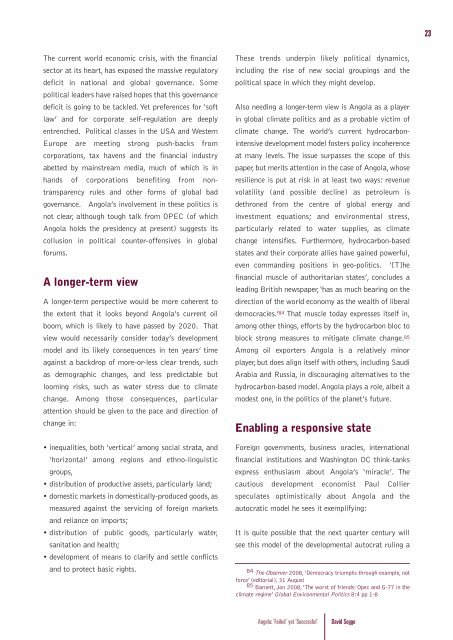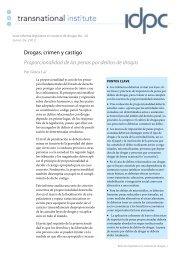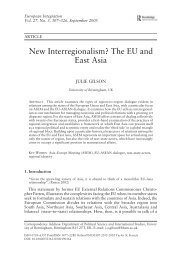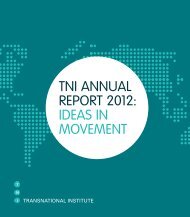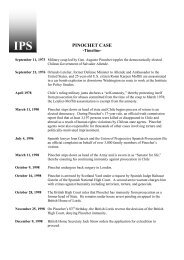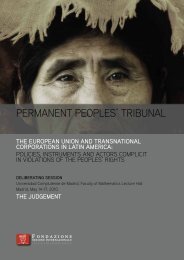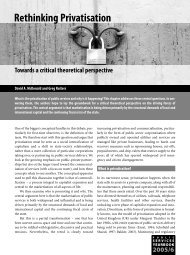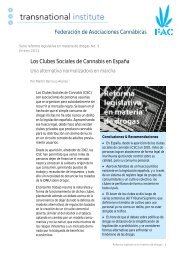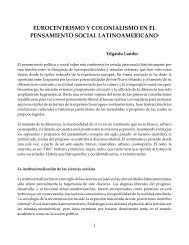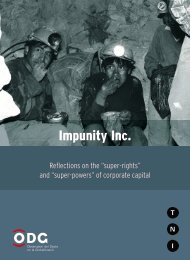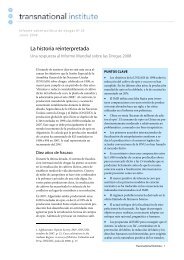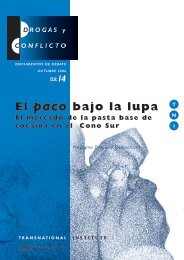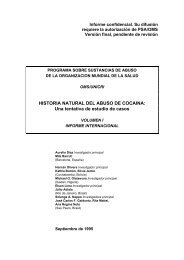You also want an ePaper? Increase the reach of your titles
YUMPU automatically turns print PDFs into web optimized ePapers that Google loves.
23The current world economic crisis, with the financialsector at its heart, has exposed the massive regulatorydeficit in national and global governance. Somepolitical leaders have raised hopes that this governancedeficit is going to be tackled. Yet preferences for ‘softlaw’ and for corporate self-regulation are deeplyentrenched. Political classes in the USA and WesternEurope are meeting strong push-backs fromcorporations, tax havens and the financial industryabetted by mainstream media, much of which is inhands of corporations benefiting from nontransparencyrules and other forms of global badgovernance. <strong>Angola</strong>’s involvement in these politics isnot clear, although tough talk from OPEC (of which<strong>Angola</strong> holds the presidency at present) suggests itscollusion in political counter-offensives in globalforums.A longer-term viewA longer-term perspective would be more coherent tothe extent that it looks beyond <strong>Angola</strong>’s current oilboom, which is likely to have passed by 2020. Thatview would necessarily consider today’s developmentmodel and its likely consequences in ten years’ timeagainst a backdrop of more-or-less clear trends, suchas demographic changes, and less predictable butlooming risks, such as water stress due to climatechange. Among those consequences, particularattention should be given to the pace and direction ofchange in:• inequalities, both ‘vertical’ among social strata, and‘horizontal’ among regions and ethno-linguisticgroups,• distribution of productive assets, particularly land;• domestic markets in domestically-produced goods, asmeasured against the servicing of foreign marketsand reliance on imports;• distribution of public goods, particularly water,sanitation and health;• development of means to clarify and settle conflictsand to protect basic rights.These trends underpin likely political dynamics,including the rise of new social groupings and thepolitical space in which they might develop.Also needing a longer-term view is <strong>Angola</strong> as a playerin global climate politics and as a probable victim ofclimate change. The world’s current hydrocarbonintensivedevelopment model fosters policy incoherenceat many levels. The issue surpasses the scope of thispaper, but merits attention in the case of <strong>Angola</strong>, whoseresilience is put at risk in at least two ways: revenuevolatility (and possible decline) as petroleum isdethroned from the centre of global energy andinvestment equations; and environmental stress,particularly related to water supplies, as climatechange intensifies. Furthermore, hydrocarbon-basedstates and their corporate allies have gained powerful,even commanding positions in geo-politics. ‘[T]hefinancial muscle of authoritarian states’, concludes aleading British newspaper, ‘has as much bearing on thedirection of the world economy as the wealth of liberaldemocracies.’ 84 That muscle today expresses itself in,among other things, efforts by the hydrocarbon bloc toblock strong measures to mitigate climate change. 85Among oil exporters <strong>Angola</strong> is a relatively minorplayer, but does align itself with others, including SaudiArabia and Russia, in discouraging alternatives to thehydrocarbon-based model. <strong>Angola</strong> plays a role, albeit amodest one, in the politics of the planet’s future.Enabling a responsive stateForeign governments, business oracles, internationalfinancial institutions and Washington DC think-tanksexpress enthusiasm about <strong>Angola</strong>’s ‘miracle’. Thecautious development economist Paul Collierspeculates optimistically about <strong>Angola</strong> and theautocratic model he sees it exemplifying:It is quite possible that the next quarter century willsee this model of the developmental autocrat ruling a84 The Observer 2008, ‘Democracy triumphs through example, notforce’ (editorial), 31 August85 Barnett, Jon 2008, ‘The worst of friends: Opec and G-77 in theclimate regime’ Global Environmental Politics 8:4 pp 1-8<strong>Angola</strong>: ‘Failed’ <strong>yet</strong> ‘Successful’David Sogge


